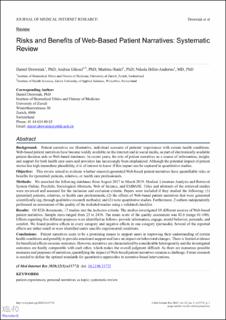Bitte benutzen Sie diese Kennung, um auf die Ressource zu verweisen:
https://doi.org/10.21256/zhaw-19875| Publikationstyp: | Beitrag in wissenschaftlicher Zeitschrift |
| Art der Begutachtung: | Peer review (Publikation) |
| Titel: | Risks and benefits of web-based patient narratives : systematic review |
| Autor/-in: | Drewniak, Daniel Glässel, Andrea Hodel, Martina Biller-Andorno, Nikola |
| et. al: | No |
| DOI: | 10.2196/15772 10.21256/zhaw-19875 |
| Erschienen in: | Journal of Medical Internet Research |
| Band(Heft): | 22 |
| Heft: | 3 |
| Seite(n): | e15772 |
| Erscheinungsdatum: | 26-Mär-2020 |
| Verlag / Hrsg. Institution: | JMIR Publications |
| ISSN: | 1929-0748 |
| Sprache: | Englisch |
| Schlagwörter: | Patient experience; Personal narrative; Systematic review |
| Fachgebiet (DDC): | 610: Medizin und Gesundheit |
| Zusammenfassung: | Background: Patient narratives are illustrative, individual accounts of patients’ experiences with certain health conditions. Web-based patient narratives have become widely available on the internet and in social media, as part of electronically available patient decision aids or Web-based databases. In recent years, the role of patient narratives as a source of information, insight, and support for both health care users and providers has increasingly been emphasized. Although the potential impact of patient stories has high immediate plausibility, it is of interest to know if this impact can be captured in quantitative studies. Objective: This review aimed to evaluate whether research-generated Web-based patient narratives have quantifiable risks or benefits for (potential) patients, relatives, or health care professionals. Methods: We searched the following databases from August 2017 to March 2019: Medical Literature Analysis and Retrieval System Online, PsycInfo, Sociological Abstracts, Web of Science, and EMBASE. Titles and abstracts of the retrieved studies were reviewed and assessed for the inclusion and exclusion criteria. Papers were included if they studied the following: (1) (potential) patients, relatives, or health care professionals; (2) the effects of Web-based patient narratives that were generated scientifically (eg, through qualitative research methods); and (3) were quantitative studies. Furthermore, 2 authors independently performed an assessment of the quality of the included studies using a validated checklist. Results: Of 4226 documents, 17 studies met the inclusion criteria. The studies investigated 10 different sources of Web-based patient narratives. Sample sizes ranged from 23 to 2458. The mean score of the quality assessment was 82.6 (range 61-100). Effects regarding five different purposes were identified as follows: provide information, engage, model behavior, persuade, and comfort. We found positive effects in every category and negative effects in one category (persuade). Several of the reported effects are rather small or were identified under specific experimental conditions. Conclusions: Patient narratives seem to be a promising means to support users in improving their understanding of certain health conditions and possibly to provide emotional support and have an impact on behavioral changes. There is limited evidence for beneficial effects on some outcomes. However, narratives are characterized by considerable heterogeneity and the investigated outcomes are hardly comparable with each other, which makes the overall judgment difficult. As there are numerous possible measures and purposes of narratives, quantifying the impact of Web-based patient narratives remains a challenge. Future research is needed to define the optimal standards for quantitative approaches to narrative-based interventions. |
| URI: | https://digitalcollection.zhaw.ch/handle/11475/19875 |
| Volltext Version: | Publizierte Version |
| Lizenz (gemäss Verlagsvertrag): | CC BY 4.0: Namensnennung 4.0 International |
| Departement: | Gesundheit |
| Organisationseinheit: | Institut für Public Health (IPH) |
| Enthalten in den Sammlungen: | Publikationen Gesundheit |
Dateien zu dieser Ressource:
| Datei | Beschreibung | Größe | Format | |
|---|---|---|---|---|
| 2020_Drewniak-Glässel-etal_Web-based-patient-narratives.pdf | 621.07 kB | Adobe PDF |  Öffnen/Anzeigen |
Zur Langanzeige
Drewniak, D., Glässel, A., Hodel, M., & Biller-Andorno, N. (2020). Risks and benefits of web-based patient narratives : systematic review. Journal of Medical Internet Research, 22(3), e15772. https://doi.org/10.2196/15772
Drewniak, D. et al. (2020) ‘Risks and benefits of web-based patient narratives : systematic review’, Journal of Medical Internet Research, 22(3), p. e15772. Available at: https://doi.org/10.2196/15772.
D. Drewniak, A. Glässel, M. Hodel, and N. Biller-Andorno, “Risks and benefits of web-based patient narratives : systematic review,” Journal of Medical Internet Research, vol. 22, no. 3, p. e15772, Mar. 2020, doi: 10.2196/15772.
DREWNIAK, Daniel, Andrea GLÄSSEL, Martina HODEL und Nikola BILLER-ANDORNO, 2020. Risks and benefits of web-based patient narratives : systematic review. Journal of Medical Internet Research. 26 März 2020. Bd. 22, Nr. 3, S. e15772. DOI 10.2196/15772
Drewniak, Daniel, Andrea Glässel, Martina Hodel, and Nikola Biller-Andorno. 2020. “Risks and Benefits of Web-Based Patient Narratives : Systematic Review.” Journal of Medical Internet Research 22 (3): e15772. https://doi.org/10.2196/15772.
Drewniak, Daniel, et al. “Risks and Benefits of Web-Based Patient Narratives : Systematic Review.” Journal of Medical Internet Research, vol. 22, no. 3, Mar. 2020, p. e15772, https://doi.org/10.2196/15772.
Alle Ressourcen in diesem Repository sind urheberrechtlich geschützt, soweit nicht anderweitig angezeigt.